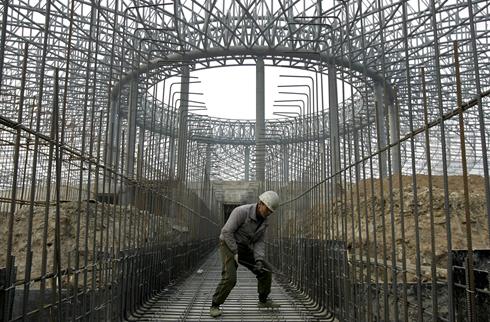Kathy Chu
USA Today

A construction crewmember works at a site in Taiyuan, in north China’s Shanxi province. China’s rapid escalation in real estate values has raised concern about an overheated market. AP

China’s frenzied real estate market is starting to turn optimists into pessimists — By Karl Gelles, USA TODAY
SHENZHEN, China — In this former Chinese fishing village where skyscrapers are springing up almost as quickly as the population of 9 million is growing, it’s not hard to find people who think real estate prices will keep rising, as well.
Zhao Jin is a believer. In late 2008, as sales of the licorice-scented tea that Zhao exports from Hunan province took off, he bought a modest three-bedroom apartment on the outskirts of Shenzhen. The property’s value has soared 63%, prompting an avalanche of calls from property agents asking whether he wants to sell (the answer is no).
“Property prices will definitely go up more,” says Zhao, who, like many others, moved here for job opportunities. “I’m an example of why the demand for real estate is there. People hear their country boy did good and come to seek their own fortunes.”
The migration of China‘s rural dwellers to its cities, along with rising income and the population’s aversion to debt, explain why many think soaring real estate prices pose little immediate threat to the economy.
But China’s frenzied real estate market is starting to turn optimists into pessimists, who say this sector could be the next big economic bust. The fear is that a collapse of China’s property market could hamper global recovery by rocking stock markets and sinking consumer confidence around the world. It also could sharply reduce China’s demand for U.S. exports, slowing the growth of the American economy.
Skeptics point to signs that consumer exuberance in China has reached a dangerous level: buyers snapping up luxury properties purely for investment; residential prices rising precipitously across the nation; and vacancy rates soaring for commercial properties.
“The pace of … the housing and property market indicators sort of smack of a bubble to me,” says Rachel Ziemba, a Roubini Global Economics senior analyst.
Nationally, real estate prices have risen for nine consecutive months in China, making home purchases unaffordable for a growing number of white-collar workers. Among large cities, commercial and residential prices in Shenzhen — known as much for its wealth as its seemingly boundless growth — have gained the fastest, rising nearly 21% in the 12-month period ended in February.
Overall, the most dramatic jumps are in Sanya, a resort city in southern China where property prices were nearly 50% higher in February than a year earlier, according to the National Bureau of Statistics. Analysts believe that China’s official data likely understate the price increases.
A $586 billion government stimulus package helped revive China’s economy and the downtrodden real estate market in 2009, but the massive capital injection has raised concerns about asset bubbles. To try to cool the property market, the government has enforced a requirement of a minimum 40% down payment on second homes and reinstated a capital gains tax on homes sold within five years of being purchased. The measures appear to be doing some good: Real estate prices increased in February by a slower rate than the previous month.
But Vitaliy Katsenelson, research director at Investment Management Associates, warns that there is still a risk that the bursting of the real estatebubble in China could turn the country from a “wind in the sails of the global economy to its anchor.”
If that happens, China may pull back on its purchase of U.S. dollars, a development that could ripple through the American economy and drive mortgage and auto loan rates higher, says Katsenelson, who has cut his exposure to industrial and energy companies that could be hurt by a downturn in China.
Economists warn that a fallout in China’s property market could have at least as much of an effect on global economics as the collapse of the U.S. housing market. “China is key to the global economy,” says Mark Zandi, chief economist at Moody’s Analytics. “If it can lead the (world) out of the recession, it can lead it back in.”
Gambling on real estate
In Shenzhen’s Nanshan luxury district, dozens of new residential buildings dominate the landscape alongside outstretched cranes and hulking masses of scaffolding. It’ll likely take years before these buildings are teeming with people.
But buyers already are bidding up prices in this ritzy part of town, which real estate agents call the “pure luxury property district” because there’s plenty of high-end housing but no low-end housing.
At the Curio — one of the most expensive new buildings in the city — buyers can purchase a nearly 2,400-square-foot apartment for $1.9 million. In the USA, that amount would buy a 2,400-square-foot beach house in Santa Cruz, Calif., a 12-acre New England farm in Sharon, Conn., or a four-bedroom pad near New York City‘s Central Park.
Demand for the Curio, which has expansive views of Shenzhen Bay and the Hong Kong skyline to the south, has been high since sales began last year. All 700 units in the first six buildings were sold before the developer finished construction, mostly to people who want to live in them full time or use them as vacation homes, says Michael Yuk, an agent with Centaline, one of the largest agencies in China. A few hundred more apartments will soon come onto the market.
Another high-end building under construction nearby, named Swire City after a Hong Kong developer known for luxury properties, also is selling quickly, for as much as $1.2 million per apartment.
For now, even completed buildings in this district are largely vacant, like so many other luxury developments in the city, because buyers aren’t moving in. Many are holding onto the property, hoping the value will appreciate. “The demand for Shenzhen property is very strong,” says Yuk, “but much of the demand is for the purpose of investment.”
Because most Shenzhen residents are transplants from other parts of China, “people have an attitude of gambling,” says Sherman Lai, CEO of Centaline. “They want to make some money and return to where they’re from.”
The gambler’s mentality isn’t confined to Shenzhen.
In Sanya, a resort city sometimes called the “Hawaii of China,” explosive real estate growth has led to questions about whether the property market is a “bubble ready to burst or a natural extension of China’s consumer society,” says a report from property consultant Crispins Property Investment Management. Many Sanya buyers are wealthy residents from other parts of China, says Marcy Zhang, Crispins general manager.
Meanwhile, in Shanghai’s older Puxi area, at the Baccarat — a posh residential building in one of the busiest commercial districts — most of the buyers are wealthy people from Hong Kong and Taiwan.
Unlike other luxury buildings in China, which are sold as concrete shells without furnishings, finished walls or floors, the marble-and-jade-accented apartments here come with Baccarat chandeliers, B&B Italia furniture and Bang & Olufsen TVs. The apartments, which range from about 900 to 1,600 square feet, cost $1.2 million to $3.5 million.
“People made a lot of money from stocks in 2006 and 2007, and came and invested” in the building, says Xie Jun Ling, a Shanghai real estate agent, noting that these investors typically already have three to four homes. “The rental market is not that great, so they buy and hold it.”
Demand for high-end real estate in China often is driven by investors rather than people buying places to live, which means “the pressure is quite big” for a potential price drop, says Michael Wu, China property analyst for Fitch Ratings.
“As long as the investment demand dominates the market, the pressure” will remain, Wu says.
The danger is that this speculation could create a glut in the residential market, says Michael Harris, investment officer at Gao Fei Consulting Services in Beijing. “If everyone puts their unit up at the same time for sale, there’s going to be so much inventory,” it could push prices down, and wreak havoc on the property market — and the economy.
‘Out of reach’
Excess inventory is a problem that already plagues China’s commercial property market.
In Shanghai and Guangzhou, the commercial vacancy rate exceeded 15% at the end of 2009. Meanwhile, in Beijing’s central business district, the commercial vacancy rate was 29.2%, while the citywide vacancy rate was about 20%, according to real estate broker CB Richard Ellis.
A healthy vacancy rate for Beijing would be around 10%, says Jack Rodman, president of Beijing-based Global Distressed Solutions, a property consultant. But he believes the city’s actual commercial vacancy rate is closer to 50%, after taking into account office space that’s been completed but isn’t on the market. To get back to a normal occupancy rate could take 15 years, he estimates.
James Macdonald, head of research at Savills China, an international property adviser, believes some corporations held off expanding or moving to new offices in the first half of 2009 because of the uncertain business environment. But demand for office space picked up in the second half of the year, he says.
“Should there be a slight overhang in the market, that will be absorbed,” Macdonald says. “If there’s an oversupply, the government will start to react.”
The question is how quickly the government can act to fill empty office space and bring residential prices back to earth.
In Shenzhen, rising home prices have priced even agents-cum-potential buyers such as Fiona Liu, with Savills Property Services, out of the real estate market. “The prices are going up a little too fast,” Liu says. “They put real estate a little out of reach for ordinary people.”
A March World Bank report said it’s difficult to determine home affordability — considered an indicator of whether real estate prices will drop — partly because of concerns that China’s data “underestimate average house price increases and overestimate average wage growth.”
Jing Ulrich, chairman of China equities and commodities for JPMorgan, warns that although home prices are rising rapidly, “such headline figures cannot be viewed in isolation of the broader trend in income growth.” From 2003 to 2008, China’s per-capita gross national income more than doubled to $2,940, the World Bank says.
Even if rising prices make home buying difficult for some people, that’s a “social issue, not a market problem” that points to a real estate bubble, according to Michael Klibaner, head of research at Jones Lang LaSalle, a property services firm. The supply of private housing in China is only enough for 20% of the population, he points out, and there are ample buyers in the market who can afford these prices.
Also, about one-quarter of all apartments in China are purchased entirely with cash, estimates brokerage firm CLSA Asia-Pacific Markets. Even those who borrow money to buy a house are required to pay a 20% to 40% down payment, a CLSA report points out. This contrasts with the USA, where no-documentation and low-down-payment loans fueled the mortgage crisis.
In China, “the lending primarily comes through big banks, and it’s relatively straightforward,” says Chris Brooke, Asia CEO of CB Richard Ellis. “People borrowing against the assets, where the interest rates aren’t transparent, those are not issues.”
Even so, real estate prices have risen too far, too fast, sceptics say.
“You can’t do any kind of rational and fundamental assessment of the market without thinking there’s a bubble,” Rodman says.
